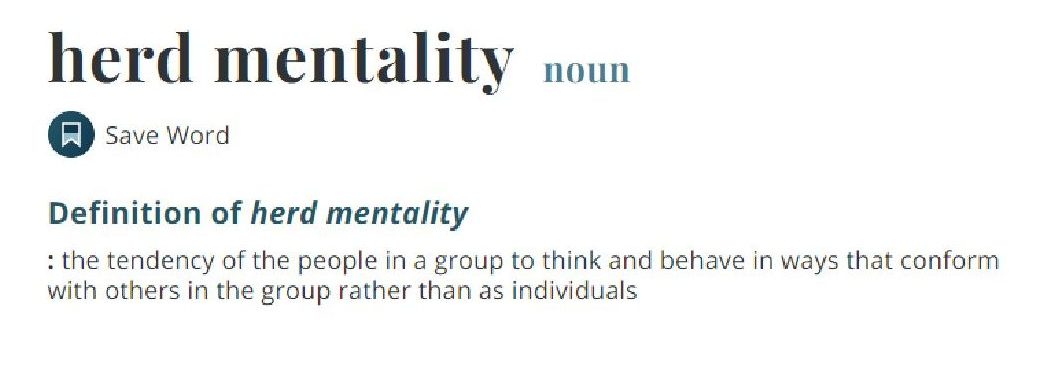How Does Constructive Criticism Halt Herd Mentality?
Constructive criticism can be a great tool in breaking herd mentality. Do you agree with it? If you have no clue about what I am talking about, it’s better to dive into the meaning of these terms and gain insights into these concepts. They are significant in any sphere of life, especially in a corporate setting.
To set the flow of this blog right, let me start with the herd mentality and then eventually move on to constructive criticism. Let’s get started right away!
So, What Is Herd Mentality?
Merriam-Webster defines Herd Mentality as “the tendency of the people in a group to think and behave in ways that conform with others in the group rather than as individuals.”

Known also by other names such as mob mentality or pack mentality, the term connotes the propensity of people to get influenced by their peers to embrace certain practices and traits on a largely emotional, rather than rational, basis.
Keep in mind that this inclination to adopt the habits, actions, ideas, and even the thoughts of our contemporaries or rivals is quite common.
However, has aimlessly following such pioneers brought down creativity, approval of interesting thoughts, and conceptualizing that could improve the positive development of an association?
Should experimentation of individual and group ideas be incorporated into the organizational hierarchy? Allow me to dive in and discover more in the impending sections.
Why Is Herd Mentality Not So Good?
I agree that it’s a natural phenomenon to have this frame of mind to follow others. But is this an appreciable trait all the time? I’m afraid I should disagree. Let’s check out some reasons.
The herd mentality represses effective social influencing and economic decision-making. The majority is compelled to settle on choices in view of novel procedures followed by leaders, influencers, and brands.
Same or similar strategies embraced by several organizations compete with each other for a life with less or minimal results and are stale over resources and ideologies. In such scenarios, cross-team discussions are found to be super effective in bringing about prevalent thoughts that could effectively boost product positioning.
And if you want some scientific proof, here it is: A study says that “the natural desire to be part of the 'in crowd' could damage our ability to make the right decisions.” Getting overly influenced by our neighbors makes us less responsive to changes in their natural environment.
Relying on our instinct is a better option. If you don't want to cause harm to our natural availability to make the right decisions, it’s crucial to depend on our instincts, gut feelings, and knowledge. It’s better not to try to fit in with the rest of the group by ignoring our creativity.
Now, What Is Constructive Criticism?
Here’s one of the most beautiful definitions of Constructive Criticism: “Criticism performed with a compassionate attitude towards the person qualified for criticism.
In other words, it’s nothing but offering feedback through well-reasoned opinions in a positive and friendly manner. It will recognize and admit both the positives and the negatives along with allowing room for improvement.
They come in the form of useful advice which yields better results if implemented. Some might view constructive criticism as positive criticism or healthy criticism or positive feedback. In essence, feedback should not be mere criticism. It shouldn’t embarrass or scare away the person who is being criticized. Empathy is the difference between constructive criticism and mere criticism.
Why Should We Break Herd Mentality?
Now, why I am referring to constructive criticism while talking about herd mentality. Remember I started this blog stating that “constructive criticism can be a great tool in breaking herd mentality”. (Yes, herd mentality needs to be broken in many scenarios.)
Let’s explore the significance of constructive criticism in a corporate setting by first touching upon the drawbacks of herd mentality in a corporate and entrepreneurial setting.
- Herd mentality can damage entrepreneurship
When you worry too much about keeping up with others, you are damaging your entrepreneurship and creativity. Entrepreneurs need to question common ideas and think differently. They become successful entrepreneurs by having and building upon their own taste or vision.
- Herd mentality can damage start-ups
Herd mentality it tribe thinking may not prove to be a good characteristic for startups. Zeroing in on ‘middle ground” group decisions which are usually “ compromise decisions” will not yield an optimal solution. They need to welcome ideas from contrarians. They should feel free to talk without any fear of facing any frowned faces.
Welcoming diversity can be your turning point. CHucking out herd mentality can be beneficial for startups in the marketplace as well. Those companies who invest in less crowded places build a profitable stronghold. Herd mentality can block unexpected success and we don't want that.
- Herd mentality can damage innovative thinking
Benjamin Franklin once said, “If everyone is thinking alike, then no one is thinking”. When you follow a crowd, you tend to adopt certain behaviors, to think/feel a certain way on various topics, as everyone in the group is doing it, probably influenced by a dominant leader. This means that they are together overriding vetoing their natural impulse to impartially appraise alternative trails. And this attitude impacts innovative thinking and creativity which does no good to any business.
- Herd mentality can damage informed decision making
A study conducted by the University of Leeds proves there is an inverse relationship between the number of people in a crowd and the number of informed individuals: as the crowd expands, informed decision makers decreases. This means that herd mentality can make the difference between the number of informed people vs the uninformed people very big, which is not good.
How Does Constructive Criticism Help Here?

Why do people stick to herd mentality? The simple answer is: to enjoy psychological safety. They do it out of hostility and fear.
Most of us fear being chucked out from a group or are anxious about being lonely or being labeled as a contrarian.
We are expected to play by the rules when we are in a pack. We foster this psychological safety by clinging to the herd mentality.
Giving and accepting constructive criticism is the best way to break away from the herd mentality. Encouraging constructive feedback can reinforce psychological safety in the workplace. Employees will no longer fear to give their honest opinions no matter what their bosses or management think about it.
Constructive criticism in view of observation and instinct among cross-functional teams plays an indispensable part in the continuous delivery of actionable feedback. These productive feedbacks in turn can be pillars in mysterious ways steering the business in the expected direction.
In fact, constructive criticism should be adopted as a session among organizations as an experiment to boost the morale and productivity of employees and teams. Such sessions can be inevitable in bringing out fascinating ideas irrespective of age, gender, or experience. Mentors and managers can capitalize on those facts for the accelerated growth of an organization. If criticism is clear, precise, and conversational it could aid the growth of personal and professional self.
There are several examples of game-changers irrespective of age who brought positive changes in the economy of an organization. They have been either supplied with the right environment or have been constantly appreciated to speak up. Brainstorming walls proves effective for introverts to convey their ideas for constructive development as they are equally creative but are a step behind in speaking up.
Wrapping Up
A majority of the organizations survive on following the existing standards which have been set by a third person. They adopt these ideas and prove to be another stereotype rather than implementing or trying out something unique or different. There is no doubt that encouraging employees to come up with ideas that could enhance business may be one way of standing out from the crowd.
Bridge Global provides ample space for individuals to come up with ideas that are good for themselves and the organization. The good thing about these ideas is that they aid in people's development and help this organization to stand out from the rest of the organizations that cultivate herd mentality. Constructive criticism and accepting criticism with grace have always been a keynote of Bridge Global’s development journey over the years and continue to do so with flying colors.


